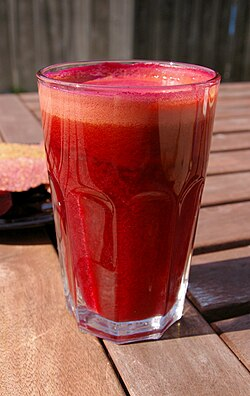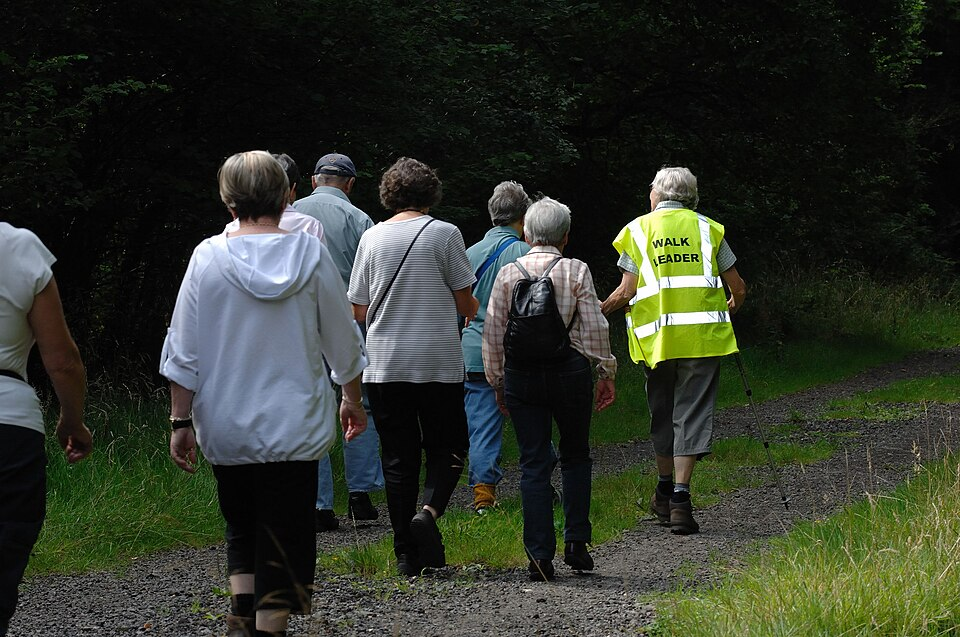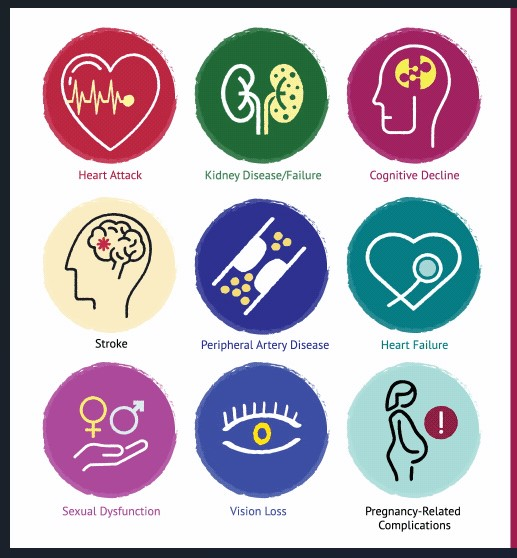Do Beets Lower Blood Pressure? The Science-Backed Answer
Picture this: you’re scrolling through health advice online, and you keep seeing claims about beets helping with blood pressure. You might wonder – does this deep red vegetable really work, or is it just another health fad?
The good news is that science has a clear answer. Recent research shows that beets can indeed help lower blood pressure. But there’s more to the story than you might expect.
What Makes Beets Special for Blood Pressure?
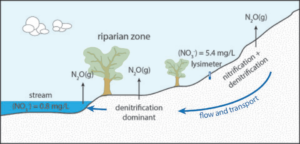
Beets aren’t magic, but they do contain something pretty remarkable: nitrates. These natural compounds are what give beets their blood pressure-lowering power.
Here’s how it works. When you eat beets, your body goes through a fascinating process. The nitrates in the beets get absorbed into your bloodstream. Then, helpful bacteria in your mouth convert these nitrates into nitrites. Finally, your body transforms these nitrites into nitric oxide.
The Beet-to-Better-Blood-Pressure Process:
Nitric oxide acts like a gentle signal telling your blood vessels to relax. Think of it like loosening a tight garden hose – when the pressure decreases, blood flows more easily through your arteries.
The Latest Research: What 2025 Studies Show
Recent studies have given us exciting new insights about beets and blood pressure. The most groundbreaking research came from the University of Exeter in 2025.
This study was special because it looked at people over 60. The researchers found something surprising: beets didn’t just work through nitrates alone. They actually changed the mix of bacteria living in people’s mouths.
The study showed that harmful bacteria called Prevotella (linked to inflammation) decreased. Meanwhile, helpful bacteria like Neisseria increased. This bacterial shift helped the body convert nitrates to nitric oxide more effectively.
Dr. Anni Vanhatalo, who led the study, explained: “We know that a nitrate-rich diet has health benefits, and older people produce less of their own nitric oxide as they age.”
How Much Blood Pressure Reduction Can You Expect?
Multiple studies have measured exactly how much beets can lower blood pressure. Here’s what the research shows:
| Study Type | Blood Pressure Reduction | Duration | Participants |
|---|---|---|---|
| Short-term studies | 3-5 mmHg systolic | 3-6 hours | Healthy adults |
| 2-week studies | 3-7 mmHg systolic | 14 days | People with high blood pressure |
| Long-term studies | 4-8 mmHg systolic | Up to 90 days | Mixed populations |
While these numbers might seem small, they’re actually quite meaningful. Even a 2-3 mmHg reduction in blood pressure can lower your risk of heart disease and stroke.
How Much Beet Juice Should You Drink?
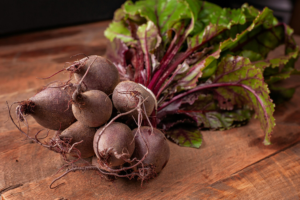
This is where things get practical. You’re probably wondering: how much do I actually need to drink to see benefits?
Research suggests that around 250ml (about 1 cup) of beet juice daily works best. That’s roughly equivalent to:
- 2-3 medium-sized fresh beets
- One standard glass of beet juice
- 70ml of concentrated beet juice “shots” (these are more potent)
If you’re new to beet juice, start with smaller amounts. Some people find the earthy taste takes getting used to. You can also mix it with other juices like apple or carrot to make it more palatable.
Fresh Beets vs. Juice vs. Supplements
You’ve got options when it comes to getting your beet fix. Here’s how they compare:
Fresh Beets
Pros: More fiber, other nutrients, less sugar concentration
Cons: Lower nitrate concentration, need to eat more volume
Beet Juice
Pros: High nitrate concentration, quick absorption, most studied form
Cons: Higher sugar content, no fiber, more expensive
Beet Supplements
Pros: Convenient, standardized dosing, no taste issues
Cons: Less research, processing may affect nitrate content, potential additives
Who Benefits Most from Beets?
Not everyone responds to beets the same way. Recent research helps us understand who’s most likely to see benefits.
Older Adults (60+)
The 2025 University of Exeter study showed that older adults get the most benefit from beet juice. This makes sense because as we age, our bodies produce less nitric oxide naturally. Also, older adults often have higher blood pressure to start with, so there’s more room for improvement.
People with Mildly High Blood Pressure
If your blood pressure readings are in the 130-150 mmHg range (what doctors call stage 1 hypertension), beets might be particularly helpful. This is often when comprehensive blood pressure management strategies that include natural approaches work best.
Those Taking Certain Medications
Beet juice can enhance the effects of ACE inhibitors, ARBs, and other blood pressure medications. While this isn’t necessarily bad, it requires medical supervision to avoid hypotension (blood pressure that’s too low).
The Mouth Connection: Why Oral Health Matters
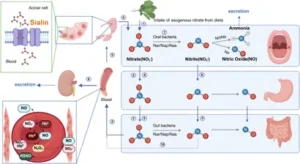
Here’s something most people don’t know: your mouth bacteria play a huge role in whether beets will help your blood pressure.
Remember that conversion process we talked about earlier? The step where mouth bacteria convert nitrates to nitrites is crucial. If you have poor oral health or use certain products, this conversion doesn’t work as well.
Things That Can Interfere with Nitrate Conversion:
- Antibacterial mouthwash: Kills the good bacteria you need
- Proton pump inhibitors: Common heartburn medications can block the process
- Poor oral hygiene: Imbalanced mouth bacteria
- Smoking: Damages the oral microbiome
So if you’re planning to try beets for blood pressure, taking care of your oral health becomes even more important.
Other Nitrate-Rich Foods That Help
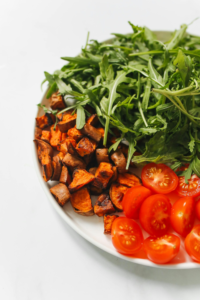
Don’t worry if you’re not a fan of beets. Other foods contain similar nitrates and can provide comparable benefits:
| Food | Nitrate Content | Serving Size | Blood Pressure Effect |
|---|---|---|---|
| Spinach | High | 1 cup cooked | Similar to beets |
| Arugula | Very high | 2 cups raw | Potentially stronger |
| Celery | Moderate | 4 stalks | Mild effect |
| Lettuce | Moderate | 2 cups | Mild effect |
The key is eating a variety of these nitrate-rich vegetables regularly. This approach aligns with proven dietary strategies like the DASH diet for blood pressure management.
Potential Side Effects and Precautions
Beets are generally safe for most people, but there are a few things to watch out for.
Beeturia (Pink Urine)
Don’t panic if your urine turns pink or red after eating beets. This harmless condition, called beeturia, affects about 10-14% of people. It just means your body processes beet pigments differently.
Kidney Stone Risk
Beets are high in oxalates, which can contribute to kidney stones in susceptible people. If you have a history of kidney stones, limit your beet intake and drink plenty of water.
Blood Sugar Considerations
Beet juice contains natural sugars. If you have diabetes, monitor your blood sugar when starting beet juice, and consider eating whole beets instead to get the fiber that helps slow sugar absorption.
Making Beets Part of Your Daily Routine
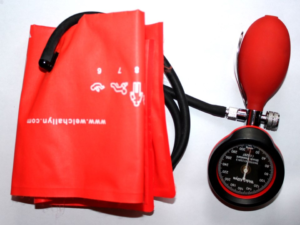
So you’ve decided to give beets a try. Here’s how to make it sustainable and enjoyable.
Easy Ways to Add Beets to Your Diet:
Pro Tips for Success:
- Start slow: Begin with 2-3 oz of juice to let your taste buds adjust
- Time it right: Drink beet juice 2-3 hours before you want maximum blood pressure benefits
- Store properly: Fresh beet juice loses potency quickly, so drink it within 24 hours
- Track your progress: Monitor your blood pressure regularly to see how you respond
The Bigger Picture: Beets in Comprehensive Blood Pressure Management
While beets can be helpful, they work best as part of a comprehensive approach to blood pressure management. Think of them as one tool in your toolkit, not a magic bullet.
The most effective strategies combine multiple evidence-based approaches:
- Dietary changes: Including beets along with other proven blood pressure supplements
- Regular exercise: Even 30 minutes of walking daily can lower blood pressure
- Stress management: Chronic stress contributes to high blood pressure
- Adequate sleep: Poor sleep quality affects blood pressure regulation
- Weight management: Even modest weight loss can make a difference
What to Expect When You Start
If you’re planning to try beets for blood pressure, here’s a realistic timeline of what to expect:
First Few Hours
You might notice a slight drop in blood pressure 3-6 hours after drinking beet juice. This is when nitrate conversion peaks.
First Week
Your body adjusts to the increased nitrate intake. Blood pressure effects become more consistent.
Two Weeks
This is when most studies see significant blood pressure reductions. Your oral microbiome may also start shifting toward more beneficial bacteria.
One Month and Beyond
Long-term benefits become apparent. Blood pressure improvements tend to be sustained with continued use.
Future Research and Developments
The field of nitrate research continues to evolve. Scientists are exploring several exciting areas:
- Personalized approaches: Using genetic testing to predict who will respond best to nitrate supplementation
- Microbiome optimization: Developing probiotics that enhance nitrate conversion
- Combination therapies: Testing beets alongside other natural blood pressure remedies
- Delivery methods: Creating more convenient and effective ways to get therapeutic nitrate doses
The Bottom Line: Should You Try Beets?
Based on current research, beets can be a valuable addition to your blood pressure management strategy. They’re safe for most people, relatively inexpensive, and backed by solid science.
However, they’re not a miracle cure. The blood pressure reductions, while meaningful, are modest. Think of beets as a supportive player rather than the star of your blood pressure management team.
Remember that managing blood pressure effectively often requires a multi-faceted approach. Beets can certainly be part of that strategy, especially when combined with other evidence-based blood pressure management techniques.
The best part? You can start today. Whether you choose fresh beets, juice, or supplements, you’ll be taking a step toward better cardiovascular health backed by solid scientific evidence.
References
- University of Exeter. “Beet juice secretly helps older adults lower blood pressure in just two weeks.” ScienceDaily, August 2025.
- Medical News Today. “Beet juice and blood pressure: Study and benefits.” Updated August 2025.
- British Heart Foundation. “Can beetroot juice lower blood pressure?” January 2025.
- Benjamim CJR, et al. “The nitrate-independent blood pressure-lowering effect of beetroot juice: A systematic review and meta-analysis.” Advances in Nutrition, 2017.
- Nutrition, Metabolism and Cardiovascular Diseases. “Effects of beetroot juice on blood pressure in hypertension according to European Society of Hypertension Guidelines.” June 2024.
- PMC. “Dietary Nitrate from Beetroot Juice for Hypertension: A Systematic Review.”
- Frontiers in Physiology. “A Double-Blind Placebo-Controlled Crossover Study of the Effect of Beetroot Juice on Blood Pressure Over 24 h.” January 2019.
- Women’s Health Magazine. “How Beets Support Heart Health And Blood Pressure, Per New Study.” September 2025.
- Fox News Health. “Blood pressure of older adults could be lowered by beetroot juice, study suggests.” August 2025.
- Medscape. “Beetroot Juice’s Blood Pressure Secret: The Nitrate Effect.” August 2025.
Medical Disclaimer
This article is for informational purposes only and doesn’t constitute medical advice. High blood pressure is a serious medical condition that requires professional supervision. Always consult with a qualified healthcare provider before making changes to your blood pressure management plan, starting new supplements, or adjusting medications. Individual results may vary, and this information shouldn’t replace professional medical guidance.
Author Bio: The Remedy Verified Team translates complex metabolic science into clear, practical strategies for everyday health.
Related Articles
- Can Garlic Lower Blood Pressure? Science-Backed Facts
- Systolic Blood Pressure: What Your Top Number Really Means
- Natural Antibiotics: 12 Evidence-Based Options + Safety Guide
- My Ear Won’t Pop: What to Try After Everything Fails
